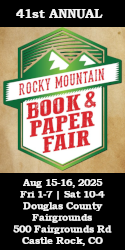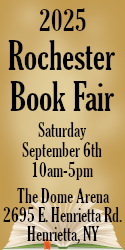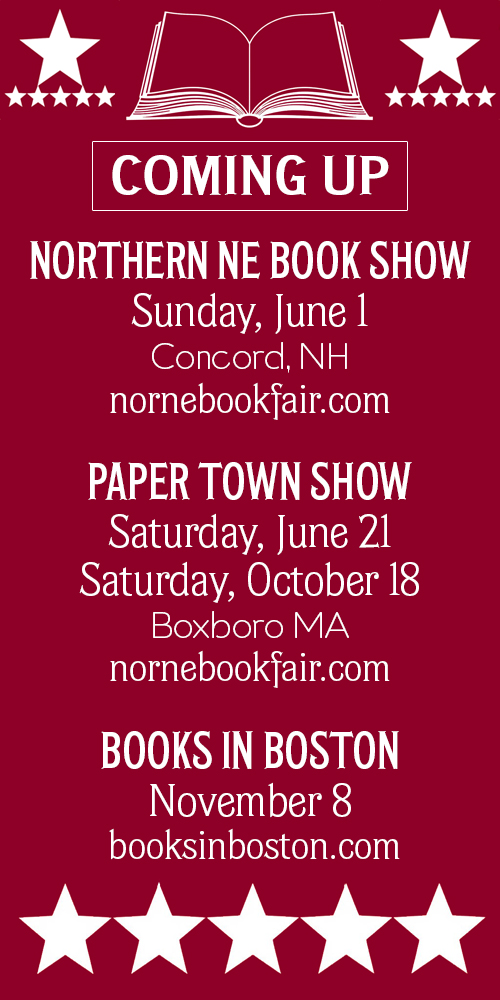Politics & Pandering
I’d really planned to write about something else – the Rochester antiquarian book fair I'd hoped to attend but was unable to (tornado watch along I-90), Larry McMurtry's book auction that by most accounts was a success, and the usual self-indulgent garden notes.
As I start this piece the television networks are winding up their coverage of the two major political conventions. The primaries and the fight for delegates dragged on for so long that the conventions themselves seem almost redundant. By most accounts the RNC and DNC and their corporate sponsors in the manufacturing, banking and entertainment industries spared no expense in putting on spectacles as lavish and pointless as the half-time show at the Superbowl, and I can't help wondering how many food banks would have benefited by the money spent on liquor, fine dining, entertainment, confetti, balloons, slick videos and the like. Both sides were generous in dishing out a lot of half-truths and heated rhetoric, but a little stingy when it came to offering specifics. I have no problem with ideological positions clearly and calmly put forth for consideration – name calling, however, doesn't make it in my book.
Even though I'm not sold on either major party candidate, I must admit that Mr. Romney has his work cut out for him. He's already being triple-teamed by SNL, Doonesbury and the late night chat show hosts and to make things even more interesting most network news reporters and interviewers seem to be running interference for his opponent – how the moderators handle themselves in the debates remains to be seen. Mr. Romney does have the support of many of the bombastic talk radio shows, but with friends like those . . . ?
Not that it matters one whit, but my own vote will probably go to Gary Johnson the former governor of New Mexico. Since he's been kept out of the debates, you'll have to do your own digging if you want to learn more about him – a good place to start would be his campaign website.
As a person with a socially liberal but fiscally conservative bias, in recent years I've found myself sympathizing more with the Libertarian position. The Libertarians tend to be policy wonks who take nerdish delight in discussing or debating fine points of monetary policy, central banking, taxation, non-intervention in the affairs of other countries, and are in favor of expanding areas of personal freedom provided it does not impinge on the freedom of others. To say that most are impatient with the nanny state would be an understatement. A Libertarian would probably say that a person should not only be free to smoke any leafy bits he wants, even if it kills him, but also free to drink a 55 gallon drum of Pepsi or Coke, even if it kills him and pisses off Mayor Bloomberg in the process. In short, the Libertarians I know are not only ideologically consistent, for the most part, but a serious and friendly group of people.
The Tea Party movement, that made itself appear ridiculous (much to the delight of television reporters) by adopting the anachronistic three-cornered hat, co-opted the Ron Paul and, to a lesser extent, the Dennis Kucinich campaigns of 2008. They have attracted weird fringe groups, each pretending to speak for the whole, and if you believe television news, the more extreme elements speak for all. Simplistic news coverage, in trying to expand ratings at a time when according to many reports people are reading less and less, depends on constructing a more or less monolithic or iconic representation of what political parties stand for. It's a lot easier that way – putting people and ideas in uncomplicated pigeon holes is simpler and more effective for the person or organization trying to advance an agenda.
At both political conventions, Republicans
and Democrats exploited ethnic identity
politics to the hilt. . .
And the television people, who control the debates, are more at ease with two predictable major party candidates – with non-mainstream third party participants it would be like trying to herd cats. All of which reminds me of what Will Rogers was quoted as having said many years ago when asked about his political affiliation – “I belong to no organized party. I am a Democrat”. In any event, for many Libertarians the public face of the Tea Party movement has become something of an embarrassment. And one thing Libertarians tend not to do is to play the ethnic game and promote class warfare as a political tool. For this I must commend them. Political parties that do so, do so to their shame.
At both political conventions, Republicans and Democrats exploited ethnic identity politics to the hilt, shamelessly pandering to the White vote, Black vote, Jewish vote, Hispanic vote, etc. At one time politicians at least gave lip service to the idea of “e pluribus unum” – nowadays balkanization is everything. Arthur M. Schlesinger Jr. had a lot to say on this subject in his Disuniting of America (1991).
The pressure for the new cult of ethnicity came less from the minorities en masse than from their often self-appointed spokesmen. Most ethnics, white and nonwhite, saw themselves primarily as Americans. “The cravings for historical identity,” Gunnar Myrdal said at the height of the ethnic rage,“is not in any sense a people's movement. Those cravings have been raised by a few well-established intellectuals, professors, writers – mostly, I gather, of a third generation”. Few of them, Myrdal thought, made much effort to talk to their own ethnic groups. He feared, Myrdal added with a certain contempt, that this movement was only “upper-class intellectual romanticicism”.
Commenting further on the neo-tribalism movement, Schlesinger adds:
In 1974, after testimony from ethnic spokesmen denouncing the melting pot as a conspiracy to homogenize America, Congress passed the Ethnic Heritage Studies Program Act – a statute that, by applying the ethnic ideology to all Americans, compromised the historic right of Americans to decide their ethnic identities for themselves. The act ignored those millions of Americans – surely a majority – who refused identification with any particular ethnic group...
If this is the paradigm for the politics of the future, why not, while we're at it, pander to the American vote? – by which I mean the Americans who first arrived here by sea or land-bridge many thousands of years ago. By most accounts this group is almost certainly the fastest-growing segment of our population.
The American Indians in the northeast, near where I live, tend not to identify themselves as Anglo-Saxons even though most have English surnames and speak the English language. Years ago Harry Hill managed some real estate we owned in Syracuse – despite his name and language of choice, Harry made it plain that he was born into and was an active member of the Turtle Clan of the Onondaga Nation of the Iroquois Confederacy. His wife Violet, on the other hand, was Polish-American – meaning one of her parents was Polish, the other Mohawk Indian.
A growing population in many parts of the country, especially the Southwest, have Spanish surnames and speak the Spanish language. Some have been here a long time and many others are recent immigrants from Mexico, Central America and the Andean regions of South America. Even though they may not yet identify themselves as such, most are observably connected to other groups of original Americans – Olmecs, Toltecs, Aztecs, Mayas, Incas, and others, including the Chichimecs, a loosely-defined, semi-nomadic group from northern Mexico that might very well have included the Apaches, Comanches and other tribes on both sides of the Rio Grande.
As a combined group, English and Spanish-speaking native Americans represent a huge demographic and I'm fairly convinced that a politically-ambitious person or persons will eventually recognize this and promote the fact that since they arrived here thousands of years before the Europeans and others, have as much right to be here as anyone else.
Is this justification for more political pandering? No more or no less than what's been done up to this point, and I'm probably guilty of opening another Pandora's box. But think of it this way. The expanded group described above could accurately call themselves the Real Americans and the rest of us (English, Spanish, Germans, Irish, French, Africans, etc.) late-comers and settlers all, took advantage of (or were taken advantage of by) what was found here. Or maybe we should all just call ourselves Americans and do away with the jobs and careers of people who make a dishonest living by dividing us and exploiting tribal jealousies to their own advantage. Then we can get down to the more important business of name-calling and class warfare.
Herding Eggplants
And being overrun by tomatoes, lima beans, winter squash and peppers of all kinds, mostly hot and spicy. Because of hotter than usual temperatures this past summer, it was the best year in memory for our vegetable gardens. The dahlias were held back by a cool spring, bounced back and are now in full bloom (as of early October).
The tomato blight of the past two years didn't happen this summer and with many days in the nineties, we had more than enough. We put a bushel or so in our chest freezer (for making sauces later on), gave them to friends, and along with hot peppers, they're just about my favorite snack food right out of the garden – except for washing, no prep time needed. How neat is that?
Growing lima beans, one of my favorite vegetables, has been a traditional act of faith – most years they show early promise, are loaded with flowers, and just about the time they begin to produce in earnest, they're done in by the autumn frosts. Nonetheless, I always think next season will be better and plant them again the following spring (I think Red Sox fans can relate). Anyway, thanks to the prolonged summer heat, this year has been much better – a yield easily exceeding the past several years combined. Same thing for eggplants, more than we could handle – of course it helps if you like eggplant (aubergine), which we do. Nowadays we mainly tend to plant vegetables that we really like. Leeks, for example – nothing beats leek and potato soup in mid-winter.
Our two lemon trees, growing in large containers, are loaded with dozens of lemons nearly ready to pick. They spend the winter in a sort of orangery (unheated greenhouse) set up in front of south-facing windows in our partly underground garage, where it never drops below 40° F. The Chicago Hardy fig tree that we planted last fall in an area that proved to be too wet, got off to a slow start but did very well (but no figs) after being transplanted to higher ground. Its sister tree, planted at the same time, lives in Ali's garden in Youngstown, Ohio. Ali chose a good location from the start and reports that the figs he picked this summer were better than any he ever had in Yemen.


























